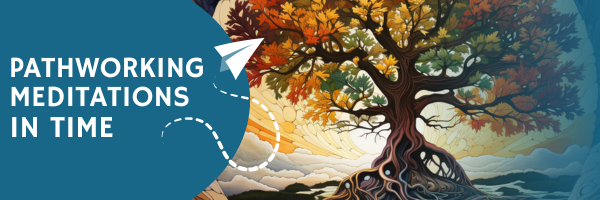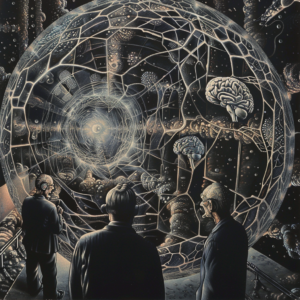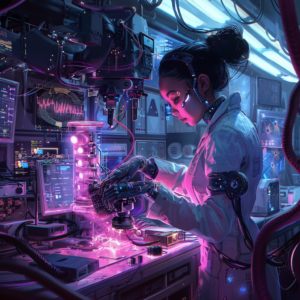
**The Pulse of Neo-Tokyo 2045**
In the heart of Neo-Tokyo, a city pulsating with the fusion of human ambition and technological prowess, the National Track Championship, a prestigious event that draws the most talented athletes from across the nation, is more than just a competition—it’s a showcase of the future. In a stadium bathed in artificial light and the cheers of a digitally enhanced crowd, every athlete is a marvel of modern science, except for one.
With his plain human physique and untouched DNA, Jordan Ellis stands at the starting line. His competitors, a lineup of cybernetically enhanced runners whose limbs glisten under the stadium lights, represent the pinnacle of human evolution in this transhumanist society, a society where technological enhancements have become the norm. But Jordan, with his unaltered genes and the fire of raw determination in his eyes, represents something even more profound—a challenge to the very essence of this transhumanist society.
**A Symphony of Speed and Spirit**
As the starter’s pistol cracks through the air, time seems to slow. Jordan’s heart races, not enhanced by beta-blockers or artificial stimulants but driven by pure human adrenaline. His muscles contract, powered not by synthetic fibers but by years of training and sheer willpower. In contrast, his competitors, their bodies enhanced with cybernetic implants and their performance regulated by internal biocomputers, rely on a different kind of power.
The track blurs beneath his feet as he sprints, surrounded by runners who are less human than machine. Their movements are fluid, almost too perfect, and internal biocomputers regulate their pacing. On the other hand, Jordan relies on the ancient rhythms of human instinct and practice.
**The Struggle for Identity in a Mechanized World**
Halfway through the race, Jordan is not in the lead, but he’s far from beaten. The crowd, accustomed to the flawless performances of enhanced athletes, watches in awe as this lone ‘ultra-human’ competes with heart. His coach, Maria, a woman who has dedicated her life to training athletes, watches from the sidelines, her face a mix of anxiety and pride. She knows the stakes are higher than just winning or losing. This race is about proving that humanity still has a place in its future, a belief she shares with Jordan.
In the stands, a young girl, her eyes wide with wonder, clutches her mother’s hand. She’s been following Jordan’s journey with fascination, her admiration for him growing with each race. ‘Can he win?’ she asks, her voice a mixture of hope and curiosity, her eyes never leaving the track.
“He might not win the race,” her mother replies, watching Jordan push against his limits, “but he’s winning hearts. And sometimes, that’s even more important.”
**A Clash of Epochs**
As the runners approach the final stretch, Jordan’s body screams in protest, each breath a fiery reminder of his humanity. The smell of sweat and the sound of heavy breathing fill the air. Around him, the enhanced athletes begin to pull away, their bodies not bound by the same fatigue that afflicts Jordan. Yet, his spirit remains unbroken. With every stride, he defies the biomechanical giants beside him, challenging the notion of being an athlete.
**The Triumph of the Human Spirit**
The race ends in a flurry of motion. Jordan does not finish first, but as he crosses the line, the applause that erupts from the crowd is not for the mechanical precision of the winners but for the extraordinary courage of the man who dared to remain purely human. The spectators, their faces a mix of awe and respect, rise to their feet, their applause echoing through the stadium. Even the enhanced athletes, their bodies still glistening with the remnants of their enhancements, join in the applause, acknowledging the triumph of the human spirit.
As the stadium echoes with cheers, the young girl in the stands feels a spark of light within her. Inspired, she turns to her mother, her voice firm with newfound resolve. “I want to be like him. I want to run just like him—without enhancements.”
**A New Dawn in Neo-Tokyo**
Later, as the crowd disperses, Jordan and Maria walk back through the now-empty stadium. They talk about the race, the future, and the impact of one man’s decision to remain unenhanced in a world that values augmentation above all. ‘You did well, Jordan,’ Maria says, her voice filled with admiration. ‘You’ve shown them that there’s more to being human than just physical enhancements.’
‘Today was a victory, Jordan,’ Maria says, her voice echoing in the quiet. ‘Maybe not on the scoreboard, but in the minds and hearts of everyone who watched. You’ve started something—a conversation about what it means to be human in an age of machines. Your decision to remain unenhanced has made a profound impact, challenging the status quo and inspiring others to question the value of physical enhancements.’
Jordan looks back at the track, a slight smile on his lips. “That’s all I ever wanted,” he admits. “To show that being human, in all its imperfection, is still worth celebrating.”
In the shadows of the neon-lit city, a tale not of enhanced athletes but of enhanced humanity continues to unfold. A story that whispers of a future where the most significant enhancements are not found in a lab but in the resilience, courage, and spirit of individuals like Jordan Ellis.
Are we ready to continue expanding on this narrative, or is there a particular part you would like to focus on or adjust?
No tags for this post.



